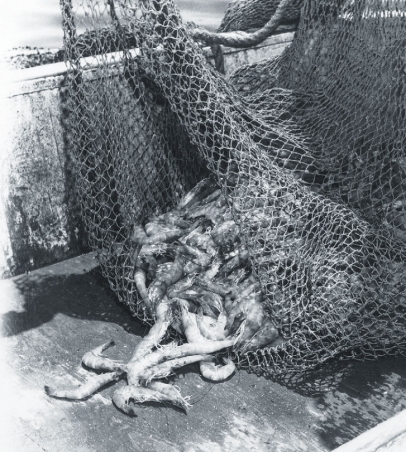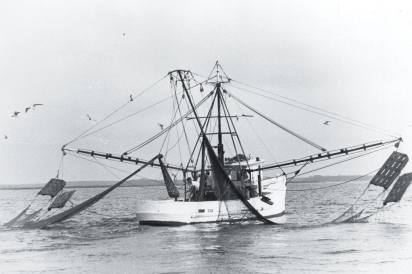NC Catch: Bringing Local Seafood from Local Fishermen to Your Table
Shrimp from the Pamlico, oysters from Middle Marsh, or mullets freshly pulled from Core Sound, well, they’re just the best, says Lauren Salter, raised in a commercial fishing family in Williston, a Down East North Carolina coastal village. She’ll crack a smile at the sight of a well-used clam rake, knowing the good eats it can rake in.
Yet she’s worried, too. Those culinary treasures from our sounds and seas are in jeopardy for a variety of reasons, like the loss of waterfront to development and especially stiff competition from low-cost, low-quality imported seafood. According to the National Marine Fisheries Service, over 90 percent of the seafood served in the U.S. is imported.
Even when you visit a beachside restaurant along the Outer Banks or Wrightsville Beach, the shrimp or fish you order may be imported, not from nearby waters. Sounds outrageous, right?
Then you can feel for the North Carolina’s commercial fishermen, like Salter’s family, who struggle to maintain viable livelihoods while working under increasingly strict state and federal regulations and decreasing demand for their product. “North Carolina fishermen love bringing fresh, local and sustainable seafood to the dock. And we love eating it,” she says. That’s why she serves as a board member of NC Catch, an organization of volunteers dedicated to getting more seafood from North Carolina waters to your table.
What’s the Catch?
Keeping fishermen fishing and bringing in their haul to feed as many as possible is the reason local Catch groups have formed up and down the NC coast.
From the northern reaches of the Outer Banks to NC’s southernmost fishing communities, four sub-groups work to promote the state’s fishing heritage and local seafood: Outer Banks Catch, Ocracoke Fresh, Carteret Catch and Brunswick Catch. Each group recognizes restaurants in their area that serve local seafood.
As the umbrella organization, NC Catch provides additional financial support, resources and printed material, and manpower with one mission in mind - to educate the public about the importance of demanding local seafood.
“Our job is to tell the fishermen’s stories to restaurants, middlemen, consumers — the buyers,” said Jay Styron at a recent NC Catch board meeting. Styron, who works with UNC-Wilmington’s Center for Marine Sciences and is a member of Carteret Catch, also owns Carolina Mariculture that farm-raises delectable oysters year-round from Cedar Island, where he grew up. Other board members include commercial fishermen, a clam farmer, a fish retailer, chefs, a seafood marketing specialist with the NC Dept. of Agriculture and Consumer Services and other state officials, NC private business managers, other non-profit officers, journalists, and community activists.
Lest you think their interest is a bit self-serving, note that they view the NC fishing industry as a community they wish to preserve. Fishing may be the lifeblood that’s run in their families for generations, but it’s also an industry that has and can feed our nation.
Buying Local
Getting the consumer to eat “local” is not a catch phrase taken lightly by any of the Catch groups. “Buying Local” means income that fishermen can use to pay their boat bills and mortgages, and keeping fish houses and seafood markets open.
Dewey Hemilright is an outspoken fisherman from Wanchese and member of Outer Banks Catch. His job, as he sees it, is “to provide access to a natural resource — the fish of the sea — that is owned by the citizens of our state.” He was recently outraged to learn that a local seafood festival would continue to allow vendors to serve imports, while giving visitors the impression they’d be eating local seafood.
Outer Banks Catch did withdraw from the 2016 Outer Banks Seafood Festival in Nags Head because they did not feel that there was a commitment to serving local seafood by vendors and participating restaurants, who counter that imported varieties are cheaper to serve and it’s harder to get the local product. Carteret Catch jumped ship from the NC Seafood Festival in Morehead City with the same objections. “Got to be NC” means just that to them.
“The seafood industry realizes their future is dependent on a knowledgeable public that demands local seafood, protects water quality statewide, and honors this heritage,” says NC Catch board member Karen Willis Amspacher, executive director of Core Sound Waterfowl Museum & Heritage Center, located “at the end of the road” on Harkers Island. “There’s a rich, place-based pride of our fishing heritage, coupled with hard work and a deep understanding and respect for the resource, that spans generations,” she says.
Amspacher saw a way to reach thousands of inland residents at the NC State Fair in Raleigh. She organized volunteers, mostly from the coast, to man a booth; got plenty of educational flyers and charts to hand out; then arranged for fresh shrimp to arrive from NC waters to be fried and handed out to attendees. That taste of fresh, NC shrimp hooked thousands into signing up for news from NC Catch, and they got the message to eat and demand local seafood.
Funding comes mainly from donations. The Z. Smith Reynolds Foundation, The Conservation Fund, local corporate donors such as Tideland EMC, as well as individuals helped get the Catch groups started and keep them going. In-kind contributions from fishermen and seafood markets have fed many up and down the coast at various fundraising and educational events. Sea Grant, an active entity of the National Oceanic & Atmospheric Administration, and NC Department of Agriculture and Consumer Services provide printed materials, facilities and backup support.
NC Catch hosts an annual summit, designed to bring fishermen, state officials, restaurateurs, and others involved with bringing seafood to consumers, as a forum to discuss how to support a robust seafood economy and culture. Consumers are welcome to attend the upcoming Seafood Summit planned for the Outer Banks on March 13th & 14th, 2017.
Check out the website at nccatch.org for recipes, a seasonal availability chart, and a local seafood suppliers directory and retail market list so you’ll know when and where you can buy shrimp, clams, oysters and fresh fish filets. You’ll also find a great list of fish species available in our waters, many called “under-utilized” because they’re not as well known, and tips for buying and storing seafood. A Facebook page posts recipes featuring seasonal catches and links to local seafood festivals.
Further projects for NC Catch include a seasonal awareness and educational project starting in Brunswick county, and a look at providing seafood access for low-income consumers and possibly school lunches in two NC inland towns, Durham and Warrenton.
Jon Haag, another NC Catch board member, owns Haag & Sons seafood market on Oak Island, and works every day with his fishing community to provide the freshest catch. He makes a point of educating his customers on the variety of fish offered, some “under-utilized,” and how to cook it. “We are so fortunate to have off our NC coast the most diverse and unique fishing resource of anywhere on this planet. Help build a stronger community by making NC seafood your first choice.”





